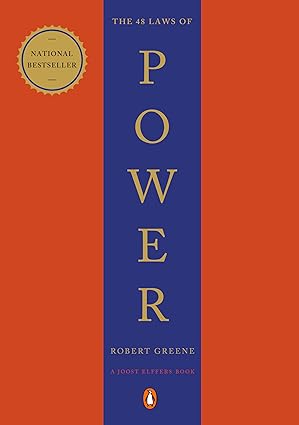
Amoral, cunning, ruthless, and enlightening, this bestselling guide is a must-read for those seeking to wield, observe, or defend against ultimate control. With over millions of copies sold, this New York Times bestseller is the definitive manual on power dynamics, penned by the author of “The Laws of Human Nature.”
In this captivating book, Robert Greene and Joost Elffers distill three millennia of power struggles into 48 essential laws. Drawing from the teachings of Machiavelli, Sun Tzu, Carl Von Clausewitz, and the life stories of figures like Henry Kissinger and P.T. Barnum, they offer a comprehensive guide to understanding and mastering power dynamics.
The laws cover a wide range of topics, from the importance of prudence (“Law 1: Never Outshine the Master”) to the value of confidence (“Law 28: Enter Action with Boldness”), and emphasize the need for self-preservation (“Law 15: Crush Your Enemy Totally”). Despite their diverse nature, all the laws share a common goal: achieving total domination.
Presented in a striking two-color format, “The 48 Laws of Power” is essential reading for those interested in conquest, self-defense, or simply understanding the rules of the game.
DOWNLOAD
“The 48 Laws of Power” by Robert Greene is a compelling and controversial guide to understanding power dynamics and achieving success in various spheres of life. Drawing on historical examples and the wisdom of thinkers such as Machiavelli and Sun Tzu, Greene presents 48 laws that he believes are essential for gaining, maintaining, and defending power.
One of the key themes of the book is the idea that power is amoral, and that those who seek to wield it must be willing to act ruthlessly and strategically. Greene uses examples from history, politics, and business to illustrate each law, showing how figures like Napoleon Bonaparte, Henry Kissinger, and Queen Elizabeth I employed these principles to achieve their goals.
Some of the laws outlined in the book include “Never Outshine the Master,” which advises against appearing too ambitious or competent in the presence of those in power, and “Crush Your Enemy Totally,” which emphasizes the importance of eliminating rivals completely rather than allowing them to remain a threat.
Critics of the book argue that its advice is manipulative and unethical, promoting a Machiavellian approach to life. However, supporters argue that it provides valuable insights into human behavior and can help individuals navigate complex social and professional situations.
Regardless of one’s opinion, “The 48 Laws of Power” has sparked intense debate since its publication and continues to be a popular and influential work on the subject of power and influence. Whether readers choose to embrace or reject its teachings, there is no denying the impact it has had on the way many people think about power and success.




